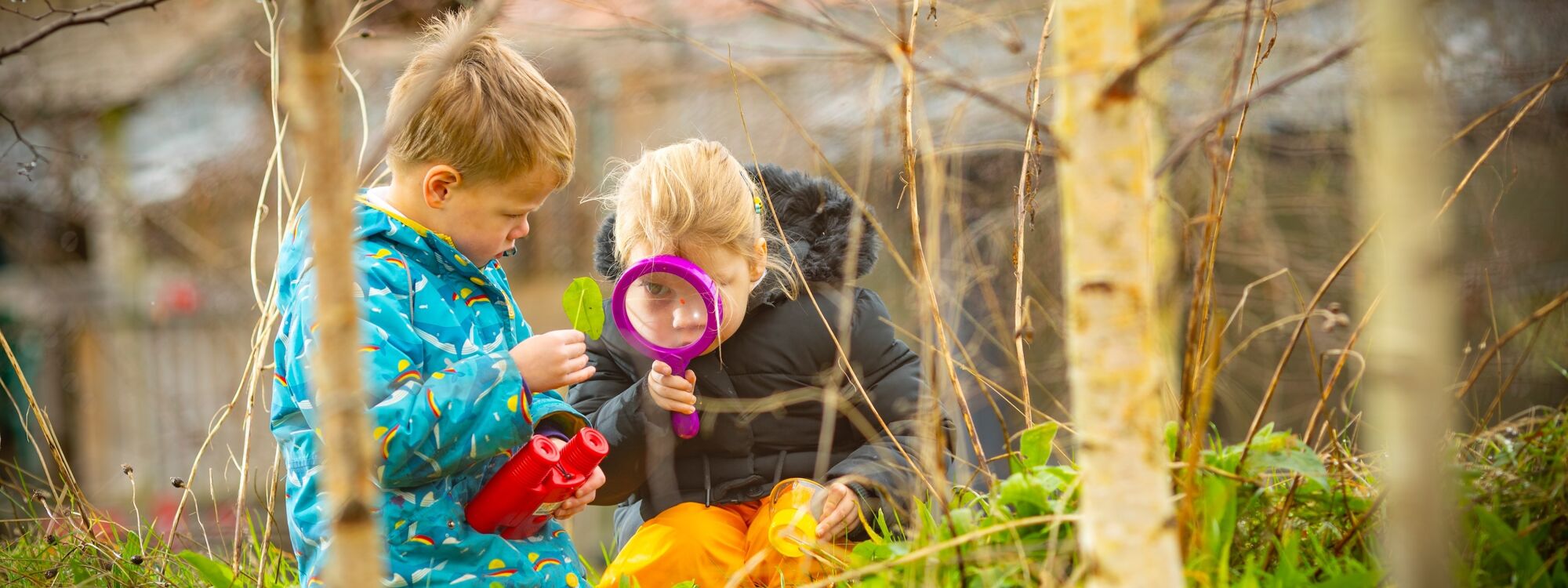
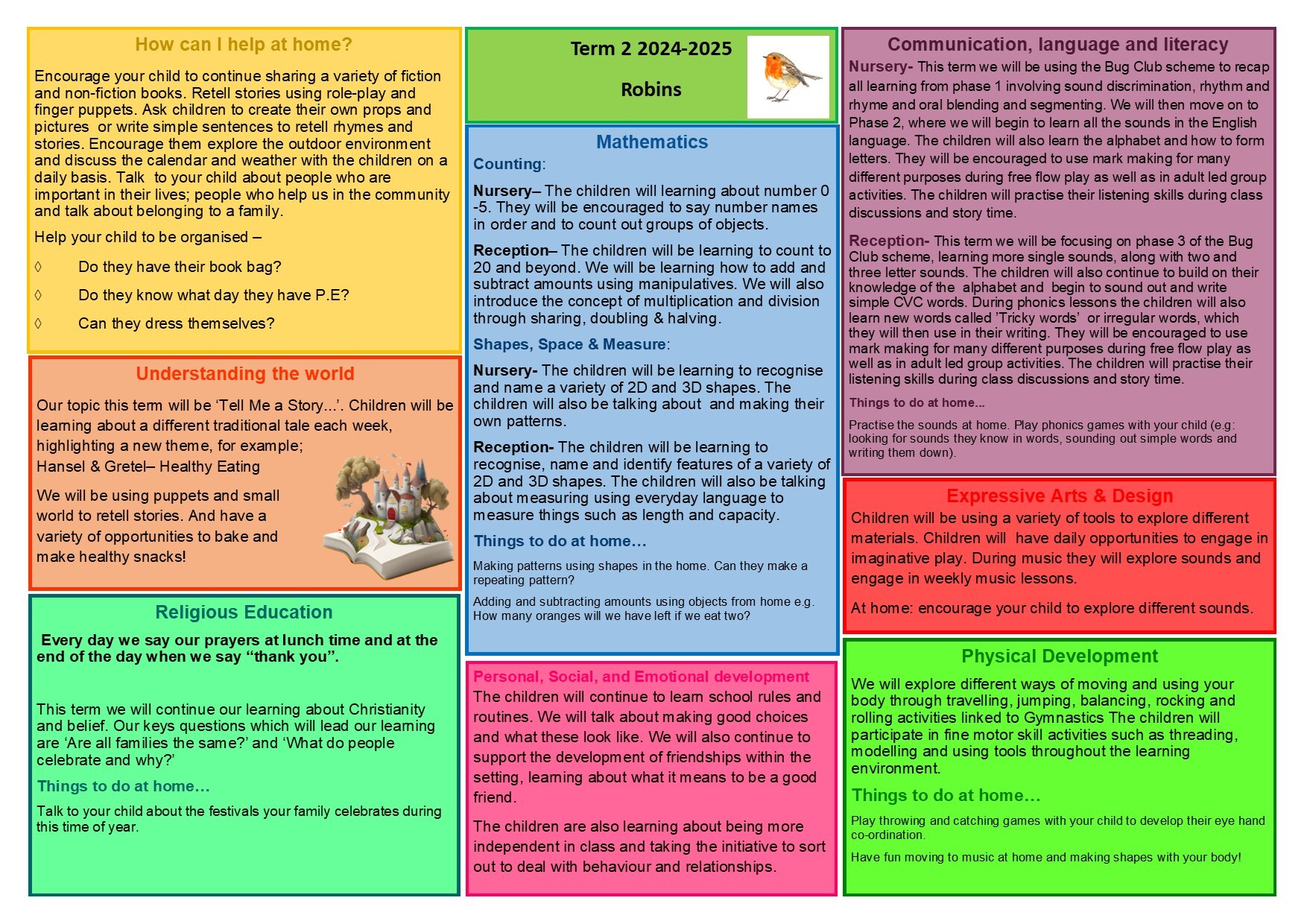
Teacher – Mrs Jenny Allan
Early Years Foundation Stage (EYFS) at Bletchingdon
Early Years at Bletchingdon provides a secure, happy and caring environment in which children learn through purposeful and carefully planned play. Every child deserves the best possible start in life and the support that enables them to fulfil their potential. We endeavour to provide a curriculum which enables children to grow in knowledge and skills while creating happy memories along the way.
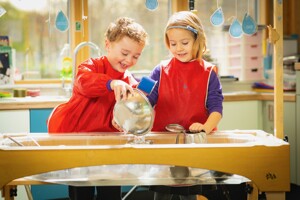 Water Play
Water Play
It is our intent that the children who enter our EYFS develop physically, verbally, cognitively and emotionally whilst embedding a positive attitude to school and learning. We believe every child should be seen as an individual, and are passionate in allowing children to reach their full and unique potential. At Bletchingdon we intend that our ambitious and inclusive curriculum educates all the children in knowledge, skills and understanding, to be effective, inquisitive, curious, independent learners and influence their wider thinking across all areas of the curriculum.
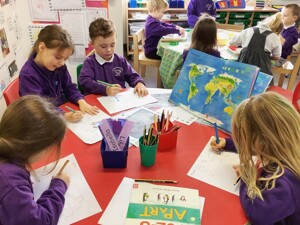 Independent Writing
Independent Writing
Each half term, EYFS staff introduce a new theme to provide inspiration for learning, whilst
providing the flexibility for children to follow their own interests and ideas. Children learn through a
balance of child-initiated and adult-directed activities. Our curriculum builds on the knowledge, understanding and skills of all children, whatever their starting points. The aim of our curriculum is to develop an enthusiasm and love for learning by:
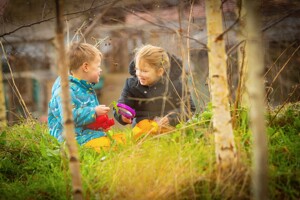 Exploring our Forest
Exploring our Forest
The learning within Robin Class is deployed by the teachers in three different styles to provide the children with a variation of learning experiences.
• Teacher initiated learning - Small group reading, writing and maths- Pupils work in small groups to learn new skills in reading, writing and maths under the direct instruction of an adult.
• Both teacher initiated and pupil initiated learning - Choosing activities – these are activities initiated by teachers but chosen and extended by the pupil. Pupils will have a variety of activities to choose from, which cover majority of the curriculum. They chose the order in which they wish to complete them, and adults facilitate pupils learning to maximise outcomes.
• Pupil initiated learning - These experiences often begin with a stimulus chosen by the pupil. Through discussion in a small group and with an adult they can explore an area of interest to them and create an outcome of value.
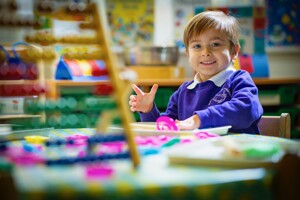 Fun at the Finger Gym!
Fun at the Finger Gym!
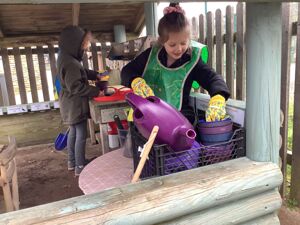 Outdoor Role Play
Outdoor Role Play
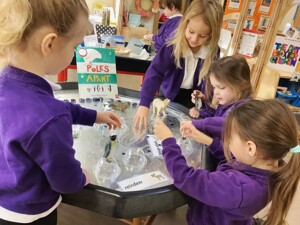 Small World Play
Small World Play
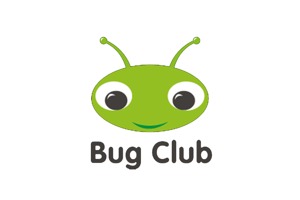
Discrete phonics lessons are taught 5 days per week in Reception. Children are taught in whole class sessions. At Bletchingdon, we use Bug Club Phonics scheme, which is is used to deliver a progressive programme of word reading skills.
Bug Club is a finely-levelled reading scheme that we use in our school to support our reading. Each child has a personalised homepage where they'll find the e-Books they've been allocated by the teacher and motivating rewards. This ensures that each child can find a book at exactly the right level for them. The online reading world ensures children can access independent reading resources anywhere at any time. Reading is the key to our learning and without this skill, children can’t develop or maintain what they have learnt and move on. Reading supports every subject within school.
Please see the 'Documents' section at the bottom of the page for further details and support with Bug Club.
• Autumn term - Reception children revisit Phase 1 and begin Phase 2. Children explore sounds and develop their listening skills. By the end of phase 2, many children should be able to read some VC and CVC words and to spell them. They start to learn to read and spell some high frequency ‘tricky’ words.
• Spring term - Children begin phases 3 and 4. Children read and write one grapheme for each of the 44 phonemes. They blend and segment CVC (consonant-vowel-consonant), CCVC and CVCC words for reading and spelling and use their phonic knowledge when trying to read and write more complex words.
• Summer Term - Children continue to consolidate and apply their knowledge in phase 4.
Nursery children also have short discrete phonics sessions 5 days per week, initially focusing on Phase 1, where they will play a variety of games and participate in short activities relating to this phase.
The Reception children will be learning to use numbers to 20 and beyond, confidently. They will be encouraged to say number names in order and to count out groups of objects. They will also learn how to find one more or one less than a given number and begin to solve problems involving simple multiplication and division.
In Nursery, children develop a love of maths through games, songs, rhymes, and play using
concrete manipulatives. There is a focus on the following counting principles; one to one
correspondence, stable order and cardinal principle. Children’s fine manipulative skills are a focus
to develop 1-1 correspondence so children count each object only once.
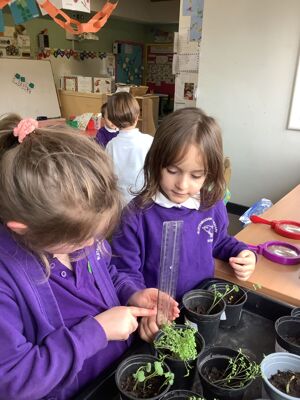 Measuring our Plants
Measuring our Plants
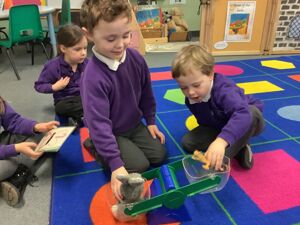 Measuring in Maths
Measuring in Maths
Physical development involves providing opportunities for our children to be active and interactive; and to develop their co-ordination, control, and movement. Children must also be helped to understand the importance of physical activity, and to make healthy choices in relation to food.
Please ensure PE uniform is worn to school on the morning of PE days. PE is often outdoor, so tracksuit bottoms and a jumper are required. Please note, all children must have trainers for use in PE and the play equipment.
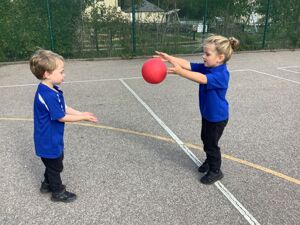 Outdoor P.E.
Outdoor P.E.
During the first half term in Nursery or Reception, all staff use ongoing assessments, observations
and conversations with the child to develop a baseline assessment. This identifies each individual’s
starting points in all areas so we can plan experiences to ensure progress.
All ongoing observations are used to inform weekly planning and identify children’s next steps. This
formative assessment does not involve prolonged periods of time away from the children and
excessive paper work. Practitioners draw on their knowledge of the child and their own expert
professional judgements through discussions with other practitioners, photographs and physical
examples such as a child’s drawing / making. Some observations are uploaded using Tapestry
and shared with the supporting parents and carers and examples kept in individual files.
For details of the Foundation Stage Curriculum please see the Statutory Framework for Early Years below.
Development Matters is non-statutory guidance for the EYFSBirth to 5 Matters is non-statutory guidance for the EYFS
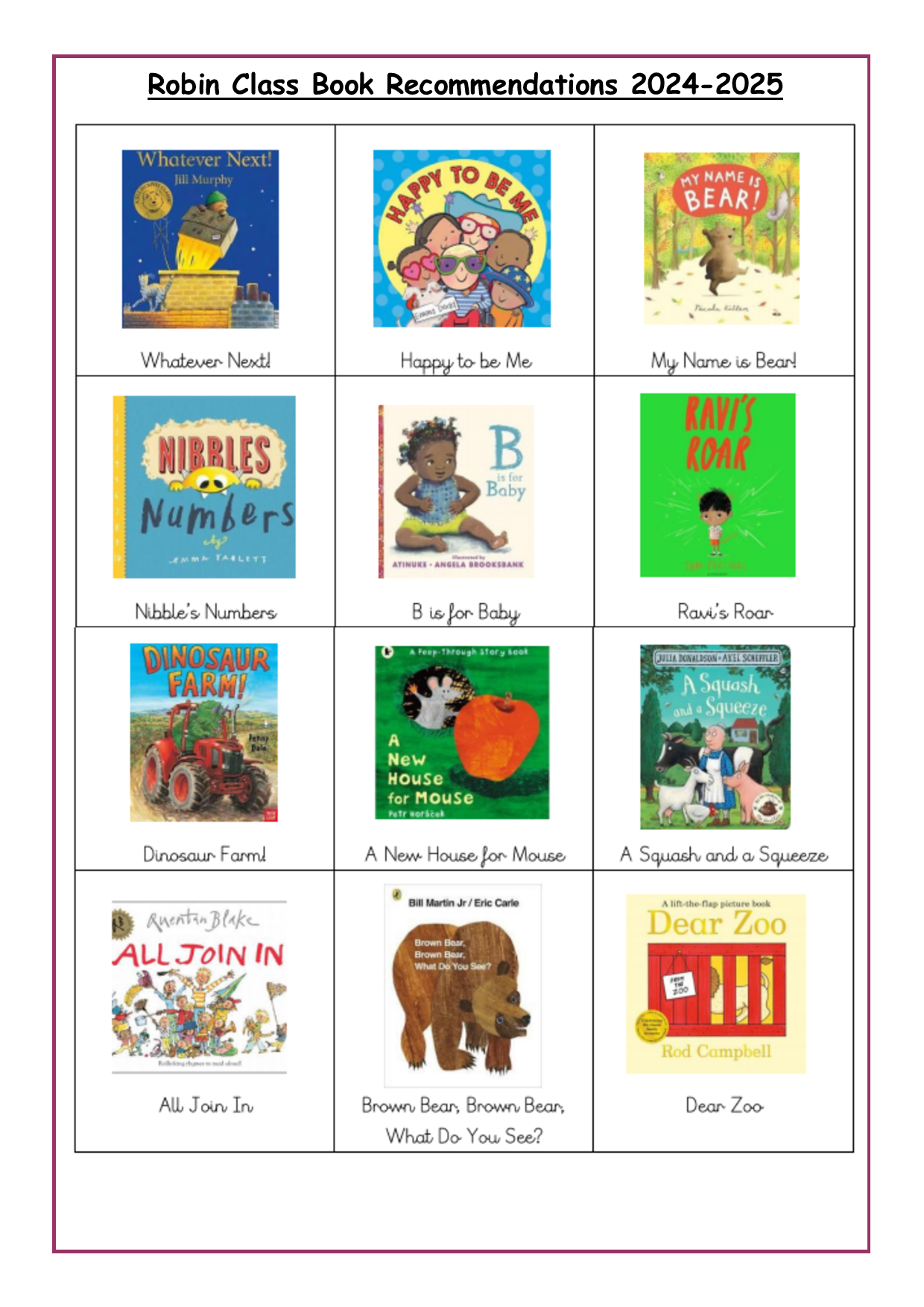
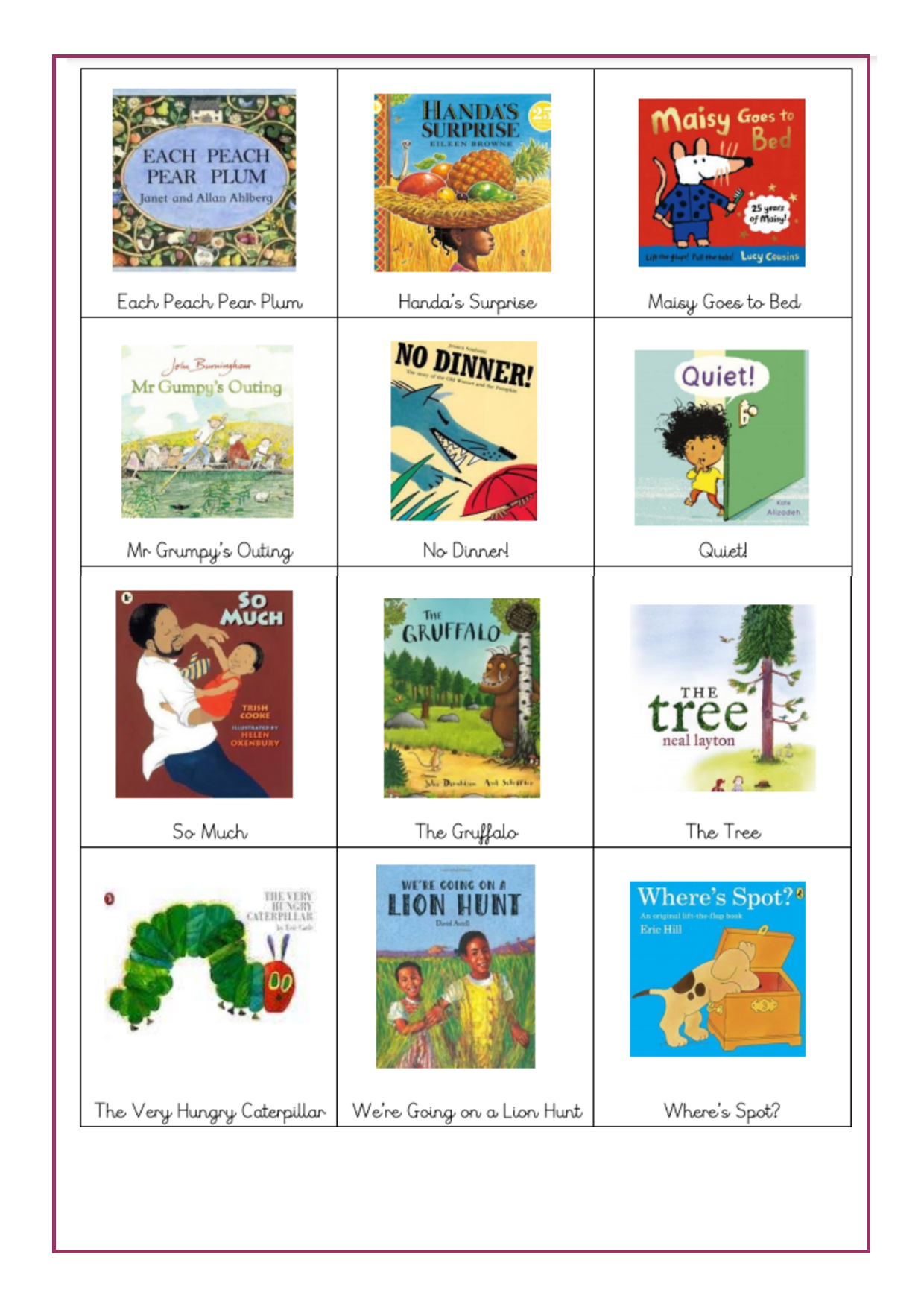
Free school milk is available for children under the age 5 and provided by Cool Milk. Once your child reaches the age of 5, you can register an account directly with Cool Milk and continue to provide your child with milk for the remainder of their time in Robins class.
Please see the attached sheet below for more information
| Page Downloads |
|---|
| Bug Club Parent User Guide |
| Parent Welcome Letter Bug Club |